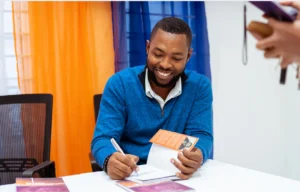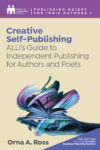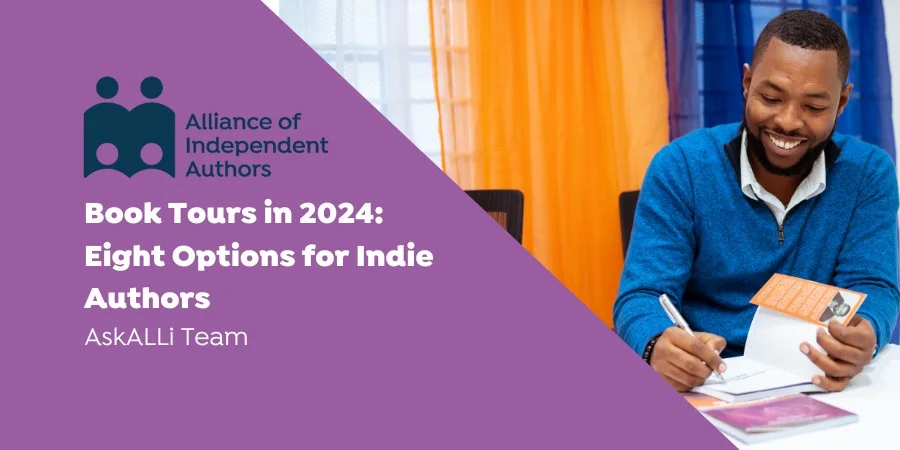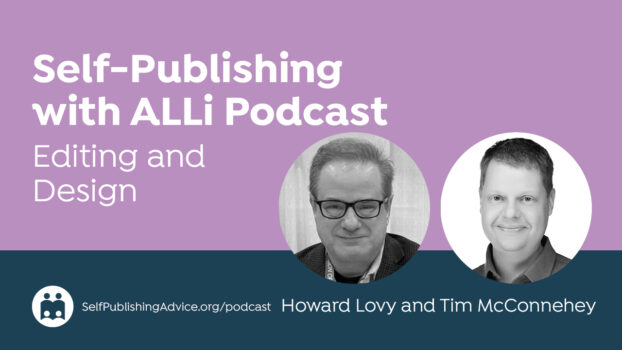
Photo by Eugenio Mazzone on Unsplash
As we venture further into 2024, we explore how indie authors can update the traditional model of book tour promotion to increase the visibility of our work. In this post, we’ll take a closer look at the options you can keep in your toolkit to build a book tour that suits your time, budget and preferences, including signposting top Alliance of Independent Author posts and guides for further reading.
The evolution of book tours in 2024
Book tours have undergone significant transformations over the years, adapting to changes in technology, reader preferences, and the publishing industry. But a book tour in essence remains a series of activities over a distinct period of time to promote the launch of your books.
In 2024, the modern book tour now encompasses a diverse range of promotional activities across a range of platforms. We, as indie authors, have the chance to tailor our tours to our own needs and preferences, as well as those of our readers. Read on for eight of the top options you can consider.
Top book tour activities for 2024
1. Virtual author events:
Platforms like Zoom, Crowdcast, Facebook Live and Instagram Live enable you to host your own interactive Q&A sessions, readings, and panel discussions for your book tour. This offers direct engagement with readers regardless of geographical barriers.
You could run one big event, or a series of smaller events to suit a range of time zones or audiences across your book tour period.
Virtual author events can be promoted across your own channels, as well as through your author connections. Consider incentives to draw people to attend, such as book giveaways or special guest speakers to talk alongside you. This works particularly for non-fiction launches where experts in your field could be invited. For fiction, consider collaborating with other authors in your genre, or for poets work with those that complement your work. This will benefit both your own sales and theirs.
Preparation is key, so consider the following steps ahead of time:
- Who will you invite and how will you know who has RSVPd? Platforms such as Eventbrite can work well for managing invitations.
- Who will host – will it be you, or someone you invite?
- Will you have supporting speakers?
- What will be the agenda? Include a positive welcome, three or four activities or ‘moments’ (these could be your reading, a speaker, a Q&A, games, polls etc.), and ensure you have planned a wrap up with a call to action (see below).
- Which passage/s will you read from your book? This is critical for inspiring your guests to make a purchase. Select one or two short excerpts or poems from your work to share that represent you and your book without giving away too much.
- What will be your final call to action? Will you be providing all your guests with a signed copy, or a code to place a discounted order from your site? And don’t forget to remind your audience how important a review is to your author business. Read up on top tips for great Calls to Action with this ALLi blog post: Calls to Action for Indie Authors

Angela Buckley
For a case study of a successful virtual event, take a look at this classic ALLi Blog from Historical crime writer Angela Buckley.
Angela hosted a Facebook Live book launch with an astonishing 5,000 participants by selecting a hosting date of key importance to her book itself, demonstrating how thinking outside the box can often make a big difference to your book tour activities: Hosting a virtual book launch event
2. Social media and influencer marketing
Beyond digital events, social media platforms such as Twitter, Instagram, Facebook, and TikTok can be utilised to share tour updates, behind-the-scenes glimpses, and exclusive content with your followers at regular times throughout a book tour, both posted live and pre-planned.
The big bonus of social media is the opportunity to collaborate with book influencers, often called ‘Bookstagrammers’ or ‘BookTokers’ who can amplify and generate buzz within the online literary community.
Reach out to reader influencers on your preferred platforms who are both the right fit for you and your audience, and who have a good reach. This could mean a high level of followers, or a smaller follower reach but specifically targeting your niche.
You must also be sure that they support your own voice, values and creative work, so consider:
- Does the influencer’s audience align well with my books’ values and mission?
- Does this person have genuine authenticity and authority?
- Does their voice align with mine?
- Are their visual communications complementary?
- How do they respond to comments?
- Are there significant differences in tone across different platforms?
 Once you have found someone that you feel may be a good fit, reach out to offer an advance copy of your work to read, review and share with their followers. If appropriate for their content, you can also invite them to collaborate with you, for example by co-hosting an event, a Q&A, or running a giveaway for their audiences.
Once you have found someone that you feel may be a good fit, reach out to offer an advance copy of your work to read, review and share with their followers. If appropriate for their content, you can also invite them to collaborate with you, for example by co-hosting an event, a Q&A, or running a giveaway for their audiences.
But be warned, influencers are approached every day to collaborate and what you offer must be a perfect match for their followers to be of interest.
You may need to work hard to find the right match for you, and anticipate they may request a fee. You can find out all you need to know for identifying, approaching and working with influencers in our comprehensive guide: Working with influencers
3. Podcast appearances for indie authors
Podcasts have emerged as a popular medium for book discussions and author interviews, providing authors with an opportunity to reach readers and engage in in-depth conversations about their books.
This is potentially most effective for non-fiction authors, where readers listen to podcasts on their chosen topic, and authors can be selected as expert speakers.
Undertake research in your genre, topic or niche to find the podcasts that speak to your audience. Don’t just look for those with very large followings, small but dedicated followings can also be powerful, particularly if you are a new author.
For a good example of different models of podcast episodes, take a listen to the different strands of ALLi’s own podcast. Here you can listen to author interviews such as the Inspirational Author Interviews with Howard Lovy, or discussions such as ‘Reaching More Readers’ which focuses on book marketing and promotion: Alliance of Independent Authors Podcast
4. Guest blogs and book blog tours
A blog tour is a scheduled series of guest posts, interviews, or book reviews on various blogs over a set period. As with podcasts, research blogs in your genre, niche or those run by authors who are similar to you and are therefore speaking to a similar audience.
If you write non-fiction, blogs about your specialist topic or similar topics will also be interested in you as an expert guest. You can then promote the book in your intro and author bio.
‘Blog tours’ can also refer to sharing your book with reviewers who have their own blogs. They will review your book through Advance Reader Copies (ARCs) releasing their honest reviews during your launch week or time period with their followers.
Approach book bloggers well in advance of your tour, as book reviewers, particularly those with a big following, receive a lot of requests. The influencer guidance above can also help when selecting book bloggers to approach.

Book signing
5. In-person author events
It can be easy to be caught up in the digital space in 2024. But don’t forget in-person events. This can be particularly important for some genres. For example if your work has a local angle, readings or workshops offered at libraries and community spaces in your area can have a big impact on local sales.
Similarly, touring local bookstores for Q&As or signings will not only raise your profile but can be great for your confidence and connection to your core readers.
If you are a Children’s author, visiting schools to speak directly with your youth audience is a brilliant way to receive direct feedback and to spread the word amongst your audience about your work. Many Childrens authors have built their following in this way. To visit schools, you will need to contact them directly, with clear information about your book, age range, what you can offer as part of your event, and ideally how it fits with the curriculum. You could offer an assembly presentation, a workshop, or a reading with time for a Q&A.
If you are considering school visits, remember that schools will be looking for authors that offer real benefit to their children or young people. So consider what your visit will offer, such as learning about the themes in your book, or sharing tips for creative writing itself as part of literacy skills.
You will need to contact local schools directly to offer your event to them, usually through the main office reception. A professionally-prepared, eye-catching flyer summarising this information to leave with them with options and contact information to follow up can be a great start to spread the word.

Photo by Jonathan Farber on Unsplash
6. Local and targeted traditional media
Local radio and print journalists can often be interested in an interview with a writer from the area with a good story to tell. It can be a great way to connect to their own readers and listeners with a positive story with a local angle.
Think about what is unique to your story – whether it’s why you write, how you completed your book or the sort of book you have written. What might make you of interest to local press?
For non-fiction books, targeted media – print, radio and digital – focused on your specialist subject can also be approached for coverage. Again, consider the ‘Unique Selling Point' (USP) you bring, and approach them with the story you can tell to their audience.
7. Book Boxes
There are lots of book boxes out there aimed at readers who can sign up to receive either a pre-chosen box, or a mystery box of high-quality books in the genre that interests them. These are often bought by prolific readers or as gifts, and can be a great way to distribute your book to new readers during your book tour.
You can approach a Book Box company directly. Look for those interested in your topic or genre and be ready to share how they can easily order your book in bulk either direct from you or from your print supplier. They will often want signed book plates to make the Box more exclusive for their users.
Be sure to check they accept indie books and look for a company that suits your genre, author brand and audience. You can easily search for some in your territory by using a search engine online.
Although ALLi doesn’t endorse any specific companies, to get a sense of what Book Boxes look like, examples include thebutterflybookclub in the UK, which focuses only on indie books, or Books Are Magic in the US, which builds Book Boxes across a range of genres, plus poetry and non-fiction. These are just two of many out there to explore. Note that participating with a Book Box company directly should not involve a cost from the author in most circumstances. As with all marketing activity, if it does, be sure to understand exactly what that involves and why.
8. Interactive content and multimedia collaborations
In 2024 book tours can also offer the chance to think outside the box. As well as short videos, authors are now exploring augmented reality book trailers, interactive assets such as book maps, or immersive events.
Digital assets can then be shared on social media , and may even go ‘viral’ amongst your target audience. Plus, if you are working in collaboration with other creatives, their audience also becomes a route to new readers.

Melissa Addey
One example of an innovative book experience launched by ALLi’s own Campaign Manager, Melissa Addey, took her book into the real world with an escape room based on the themes from her Historical-Fiction novel. Melissa said about the experience:
It was fascinating to collaborate with other creatives including the games masters who designed the puzzles based on the characters and stories I provided and the theatre designer who created the space based on my historical research.
For inspiration, you can see more about this collaboration here: The Dragon Throne.
Consider a multi-media approach if it suits your genre and audience, such as for Historical Fiction or Fantasy writers, or for non-fiction writers where creative assets can bring your topic to life. Make sure the content you produce and share directs people straight back to your sales page so you feel the benefit of your hard work.
Should you consider PR and Marketing companies for a book tour?
Using an agency to coordinate your book tour is an option that can free you up and bring expertise to your activity, but it can be pricey. Expect to pay in the low to mid thousands for a comprehensive book tour plan and delivery. This is a big investment, however there are examples of experienced PR agencies taking indie books into the bestseller lists.
Be careful. Many suppliers out there promise a lot, but cannot deliver the experience or reach that they offer. Do your due diligence before taking on any agency.
Ask yourself: Which authors and books have they represented? Are they experienced in my genre? How did the books they represent do in terms of sales (look at rankings or reviews on sales platforms)? Have those authors provided testimonials?
If you are considering a PR or Marketing agency, ideally speak directly with authors they have represented to hear honest feedback on the service provided. And, as with all marketing in business, consider the investment you can afford to make and the risk you can afford to take.

Photo by Brad Neathery on Unsplash
Prioritisation and time management while running an indie book tour
While digital in particular presents endless opportunities for authors to connect with readers through book tours, balancing promotional efforts with the demands of writing requires careful planning and time management.
Build in time for your book tour and expect it to require several weeks or even months of planning and delivery to be a success.
Prioritisation is key, particularly if you also have a part-time or full-time job. Consider what will work best for your audience, and what you will enjoy the most. These factors will help determine not only what will have the most impact, but also what you will most likely see through to completion alongside other commitments.
For example, if you love meeting people and enjoy talking about your work, and you write non-fiction local history books, focusing on finding relevant history podcasts and hosting some live events in your local area may make the most sense over chasing social media coverage or attempting to garner influencer activity. As always, the benefit of being an indie author, is taking control of our own plans, so you can build a tour that suits your work, your time and you.
Conclusion
It may look a little different, but the book tour remains a cornerstone of author promotion strategies for book launches and wider marketing in 2024.
By embracing innovative approaches, particularly the power of digital, book tours can expand your reach in an increasingly competitive market. Whether you're a seasoned author or a debut novelist, harnessing the potential of book tours can be a big step towards building a loyal readership.
Find out more:
 A book tour can take place alongside a range of other promotional activities to make the biggest noise around a book launch or other key moment. Take a look at this detailed promotion post from the ALLi archive for lots more ideas, such as promo stacking and paid-for advertising: The Seven Process of Publishing: Book Promotion
A book tour can take place alongside a range of other promotional activities to make the biggest noise around a book launch or other key moment. Take a look at this detailed promotion post from the ALLi archive for lots more ideas, such as promo stacking and paid-for advertising: The Seven Process of Publishing: Book Promotion
 For a comprehensive guide to self-publishing, check out ALLi's guidebook Creative Self-Publishing. This book is available for purchase in multiple formats in our bookstore.
For a comprehensive guide to self-publishing, check out ALLi's guidebook Creative Self-Publishing. This book is available for purchase in multiple formats in our bookstore.
Members enjoy free access to the ebook (login and navigate to Publications>Guidebooks).





Absolutely! Here’s a more human touch to the review:
“Discovering this guide on book tours for indie authors in 2024 felt like stumbling upon a hidden gem. It’s like having a trusted friend who knows the ins and outs of the publishing world, sharing their wisdom with you. With eight carefully curated options laid out, it’s a roadmap for authors seeking to navigate the labyrinth of book promotion. Get ready to embark on an adventure that could bring your literary dreams to life!”